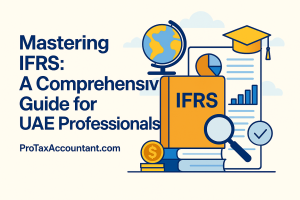Navigating the complexities of corporate tax in the UAE starts with one critical calculation: determining taxable income. For businesses, understanding this process is essential to ensuring compliance with tax laws and avoiding costly errors.
In this guide, we’ll break down everything you need to know about taxable income, as outlined in the “Determination of Taxable Income” guide.
What Is Taxable Income?
Taxable income forms the foundation of corporate tax calculations. Under the UAE Corporate Tax Law, the starting point is Accounting income, which is the net profit or loss presented in financial statements. These statements are typically prepared according to:
- IFRS (International Financial Reporting Standards)
- IFRS for SMEs
- The income and expenditure statement for businesses using the cash basis of accounting
However, accounting income is not the final taxable income. Adjustments are required to align with the provisions of UAE Corporate Tax Law.
Key Adjustments to Accounting Income
Article 20(2) of the Corporate Tax Law specifies adjustments necessary to determine taxable income. Here’s a detailed look:
1. Unrealized Gains and Losses
- Businesses must include both realized and unrealized gains and losses in taxable income unless an election is made to use the realization basis.
- If the realization basis is elected, unrealized gains and losses are excluded.
- Important Note: This election is typically made during the first tax period and is irrevocable.
2. Exempt Income
Certain income types are exempt from corporate tax and must be excluded from taxable income, including:
| Type of Exempt Income | Conditions |
|---|---|
| Dividends and Profit Distributions | Received from a juridical resident person |
| Income from Participating Interests | At least 5% ownership, AED 4M+ acquisition cost, 12+ months holding, and specific residency conditions |
| Income from Foreign Permanent Establishments | Must elect exemption; subject to at least 9% foreign tax; losses must be offset first |
3. Reliefs
Businesses may apply tax reliefs to accounting income, such as:
- Qualifying Group Relief
- Business Restructuring Relief
4. Non-Deductible Expenditure
Not all business expenses are deductible for corporate tax purposes. Examples include:
| Type of Non-Deductible Expense | Details |
|---|---|
| Expenses not wholly and exclusively for business | Personal expenses are excluded |
| Capital Expenditures | Long-term benefit expenses |
| Disallowed Net Interest Expenditure | Limited to AED 12M or 30% of adjusted EBITDA |
| Entertainment Expenditure | Only 50% deductible for partners; fully deductible for staff |
| Expenditure related to exempt income | Any costs associated with exempt income |
| Bribes, fines, and penalties | Always non-deductible |
| Employer contributions to private pensions | Capped at 15% of total remuneration |
| Recoverable VAT and foreign tax | However, foreign tax credits may apply |
5. Adjustments for Related Party Transactions
Transactions with related parties must be conducted at arm’s length, meaning they reflect fair market value. If not, adjustments are made to align with arm’s length pricing.
6. Other Adjustments
Additional adjustments may be required as specified by Ministerial Decisions or specific scenarios under tax law.
Tax Loss Relief
After applying the adjustments above, the taxable income may be further reduced using tax loss relief:
- Losses can be carried forward to offset future taxable income.
- The maximum offset is 75% of taxable income for a given period.
- Businesses must utilize their own losses first before applying transferred losses.
Corporate Tax Rates
The final taxable income is subject to the following corporate tax rates:
| Taxable Income Bracket | Corporate Tax Rate |
|---|---|
| Up to AED 375,000 | 0% |
| Above AED 375,000 | 9% |
For Qualifying Free Zone Persons, the rates differ:
| Income Type | Corporate Tax Rate |
|---|---|
| Qualifying Income | 0% |
| Non-Qualifying Income | 9% |
Conclusion
Determining taxable income is a multi-step process that requires careful adjustments to accounting income in line with the UAE Corporate Tax Law.
From accounting for unrealized gains to handling non-deductible expenses, businesses must understand these provisions to ensure compliance.
While this guide offers a detailed overview, consulting professional advisors or tax consultants like Pro Tax Accountant can provide tailored insights to streamline your compliance efforts.
By mastering these adjustments, businesses can confidently manage their tax obligations and focus on growth.
Need Help with Corporate Tax in the UAE?
Let Pro Tax Accountant simplify your tax compliance process. Contact us today for expert advice!





